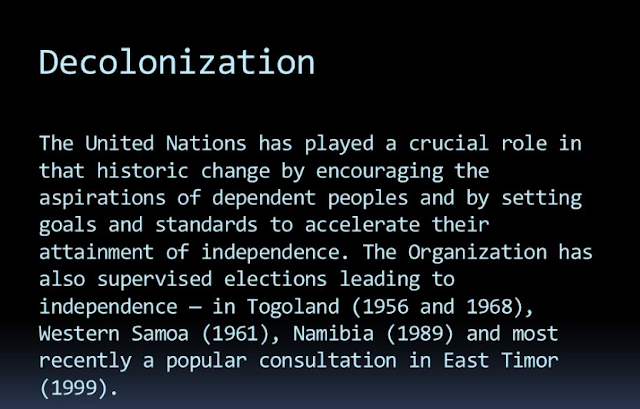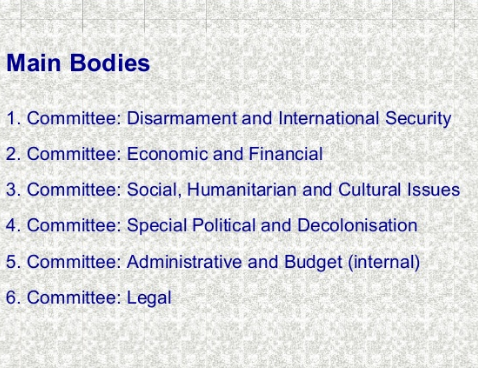The UN Role in Decolonisation
The Trusteeship Council was recognised from the beginning as being unfavourable for a radical attack upon colonialism, due to the built-in advantages granted to conservative forces by the Charter provisions limiting the system to dependent territories voluntarily designated by their possessors and establishing a balance in the Trusteeship Council between the administering authorities and other states elected to membership.The anti-colonial movement which gained momentum after World War II, gradually launched a campaign to expand the trusteeship implications of Chapter XI, and succeeded in establishing the principle that the administration of all non-self-governing territories should be subjected to international examination and criticism in somewhat the same manner as the administration of Trust areas.
The major strategy of the anti-colonial bloc has been to convert the General Assembly, the organ in which its relative voting power is greatest and has steadily increased, into a forum for the consideration of all issues relating to colonialism, whether they are specifically concerned with the Trusteeship system, the Declaration regarding non-self-goveming territories, or demands for national self-determination. An aggressive and broadly successful campaign was waged to override claims of domestic jurisdiction, restrictive interpretations of the commitments under Chapter XI, and demands that the General Assembly respect the delegation of functions to the Trusteeship Council and to
subordinate organs established by itself.
As the Assembly became more and more clearly an instrument of anti-colonial forces, it progressively asserted its competence to reject positions taken by states possessing colonies, claiming for itself the authority to direct the decolonisation process. Its Resolution 1514 (XV), referred to before, was a veritable Emancipation Proclamation for dependent peoples. The Assembly supported the general thesis that all peoples have a right of national self-determination. It has to a very considerable extent functioned as the institutional vehicle for the elaboration and application of the principle that international organisation has a broad mandate to intercede on behalf of dependent peoples whenever they or their supporters find themselves at odds with colonial powers. In brief, the Assembly became the means for nullifying the provisions of the Charter which seemed to guarantee that the United Nations would not adopt a radical attitude toward colonialism, as it had previously been used to cancel the Charter agreement that the UN would not serve in basic political matters as an agency of international opposition to the policy of one of the Big Five.
The Special. Committee on decolonisation is charged with bringing to self-government or independence, 17 non-self-governing. governing territories-most of which are small island states. They are what is left of an original list of 72 territories voluntarily submitted by United Nations member states as non-self-governing in accordance with Article 73 of the United Nations Charter.
One of the most important tools of the Special Committee in fulfilling its mandate is its annual regional seminars, held since 1990 in either the Pacific or Caribbean region, generally in May, during the week of solidarity with peoples of the All Colonial Territories Fighting for Freedom, Independence and Human Rights. The fact that they take place in the geographical and cultural regions where the territories are located adds an important contextual dimension to the discussion. The seminars invite members of the Special Committee, other interested member states, the administering powers (France, Portugal, United Kingdom, United States), representatives of non-self governing territories, which allow for focused and frank discussions on decolonisation and a lively exchange of views on a variety of issues of concern to the peoples of the territories.
The Declaration of the Second Decade contained in the General Assembly Resolution 55/146 represents a renewed commitment of the international community to resolve the remaining colonial situations. The Special Committee in its new approach following the resolution has decided to develop work plans with specific targets for the decolonisation of the Territories on a case-by-case basis. This approach has been endorsed by the administering powers in a climate of greater cooperation between them and the Special Committee.Decolonisation is one of the great revolutions of our century. It was brought on by forces that were neither generated nor controlled by international organisations. But the United Nations has contributed to the speed and direction of the movement and, in some instances at least, has helped to promote a more peaceful transition to independence and self-government. Since 1945 the UN has provided a forum where anti-colonial spokesmen could articulate their position; it greatly expanded the principle of international accountability; and it developed more effective instruments for international supervision of colonial administrations. Above all, it gave an element of legitimacy to independence movements everywhere in the world. For all practical purposes, the Trusteeship Council can be wound up now. It has been rendered redundant following the completion of its mandate.

.png)









No comments:
Post a Comment